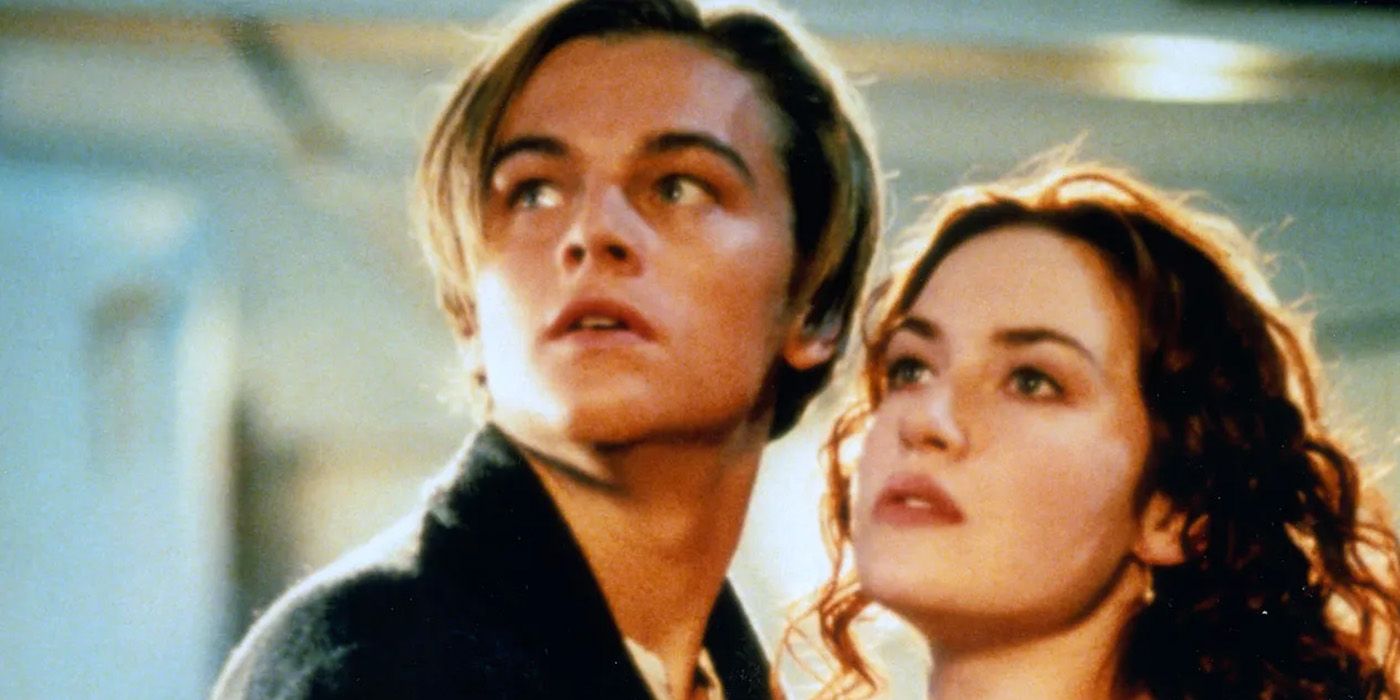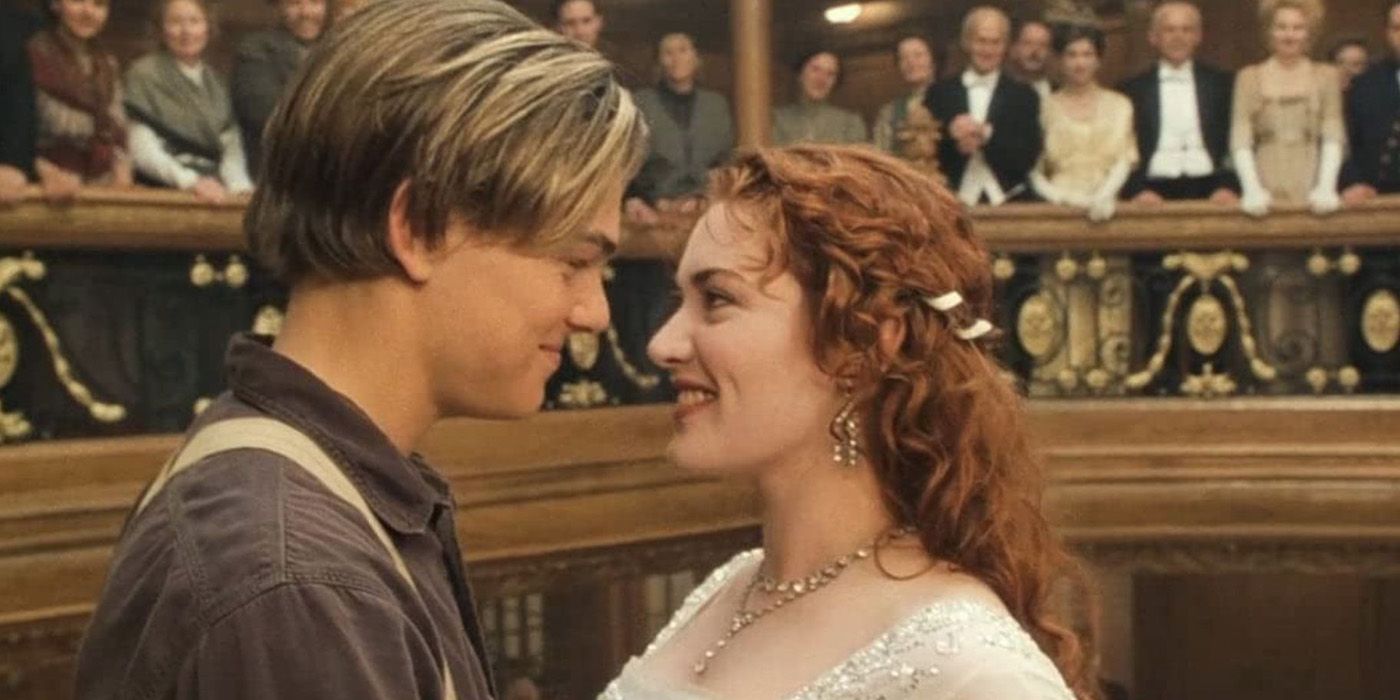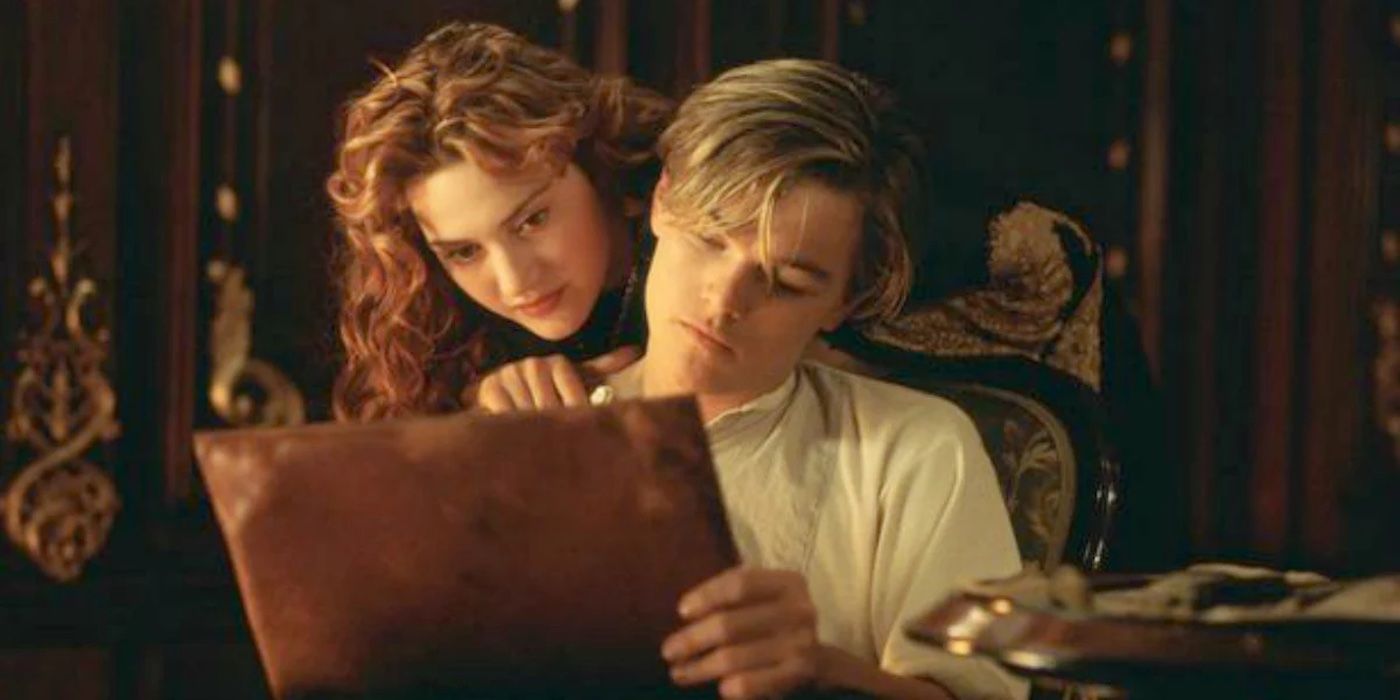Following Titanic's recent return to theaters for its 25th anniversary, and to the tune of an extra $22.3 million, the discussion floodgates (ahem) once again opened regarding the disaster-romance's merits. Writer-director James Cameron put the door debate to bed with science, sure, but is Titanic even good? (Yes, it is.) Seriously, though, isn't it overrated? (Nope, but it's fine if your mileage varies.) Dissecting a pop culture giant this gargantuan isn't just nerd heaven for movie fans — Titanic calls for retrospective interrogation. Cameron's undertaking genuinely changed the future of American filmmaking, and sitting pretty as the fourth highest-grossing film of all time is nothing to sneeze about. Whether Titanic's melodrama works for individual viewers largely comes down to Cameron's decision to center the tragedy of the real vessel around a fictitious, three-hour love story. So, with a romance at the film's ocean-deep heart, let us ask: is Titanic's love story actually worth the $200 million Cameron poured into his project?
What Makes a Love Story Timeless?
Although there are plenty of narrative rules for writers to follow or break at their caprice, there's no official list of what constitutes a timeless love story. Examining older films that resonate with audiences, however, reveals some thematic commonalities. For one, the characters must be engaging enough to earn the audiences' investment. Character growth is paramount, especially if one of the two lovebirds challenges the other's perspective; if they're inspired to aspire by their lover, that's a win. The relationship demands some level of stakes. Depending on said stakes, a happily ever after outcome isn't guaranteed. If tragedy does strike, their love endures regardless. That affection's got to be bone-deep, a swooning regard so world-shattering it eternally upends the others' life course. If either partner displays a selfless or sacrificial nature, especially if the narrative setting includes risk or conflict, that adds extra piquancy.
Those qualifications are as inseparable from Titanic as a baby-faced Leonardo DiCaprio yodeling, "I'm the king of the world." Indeed, if one mixes and matches said narrative particulars, Titanic is little different from some of Hollywood's undisputed classics. If one may be so bold as to invoke this particular title, Casablanca is as much a staple of film history as can be. And what advances the plot, fosters character development, and advocates a humanist message that's intentionally applicable to the real world? Rick (Humphrey Bogart) and Ilsa's (Ingrid Bergman) tumultuous romance. Rick's association with Ilsa snaps him out of his spiraling misery so considerably, he devotes his life to resisting fascist regimes.
Similarly, in Titanic, Jack forever alters Rose's situation by providing her with the impetus and support to shatter the confines of the cage that torments her so. She embarks on countless adventures in her next 84 years, bound to no one and vibrantly soaring. Rick and Ilsa and Jack and Rose are both damaged by ruthless external forces, and their romances flourish even as those forces wrest them apart. By those measurements, if we revere Casablanca's love story as timeless, then Titanic's falls in line flawlessly.
Many Romance Films Share Similar Themes as 'Titanic'
Although they're towering examples, Titanic and Casablanca indubitably aren't the only critical darlings powered by — or wholly preoccupied with — romance. Richard Linklater's Before trilogy chronicles a relationship's arc from idealized fantasy to fractured reality, but the premise of the first film, Before Sunrise, is irresistibly appealing to anyone with a drop of romanticism in their bones. Two youths stumble into one another's orbits and discover a connection as instant as an electric shock. It's love at first sight — in fact, it's true love and the one that got away rolled into a single night.
More examples include Wong Kar-wai's masterful In the Mood for Love, which reckons with loneliness and yearning, how the cost of an unconsummated forbidden infatuation leaves you whispering into a silent void. City Lights is undoubtedly love at first sight between Charlie Chaplin's Tramp and Virginia Cherrill's flower girl, and their true love overcomes all barriers. Sleepless in Seattle tenderly examines loss, heartbreak, and whether destiny exists beyond fictional confines. Eternal Sunshine of the Spotless Mind posits that love is worth remembering despite the inevitable pain. Any version of Beauty and the Beast and Pride and Prejudice sneakily analyzes the idiom "appearances can be deceiving." (Likewise, honorable mention goes to The Shape of Water for saying everyone deserves acceptance.) And then, there's Up: a complete romance within ten minutes where the lovers cherish long, great-hearted lives together — but how does one move forward after loss? Can a widower still find things worth existing for?
'Titanic' Captures Universal Experiences Like Love, Fear, and Loss
These films' narrative kinship boils down to one key ingredient: Like Titanic, they're universal experiences. This was a deliberate decision on James Cameron's part. "The script for Titanic is earnest and straightforward, wearing its heart on its sleeve," he wrote in a piece for the L.A. Times. "It intentionally incorporates universals of human experience and emotion that are timeless — and familiar because they reflect our basic emotional fabric. By dealing in archetypes, the film touches people in all cultures and of all ages."
If Titanic's endgame thesis is the value of human life, dozens of smaller components splinter off from that notion. Life and death, fear and hope, love and loneliness, loss and determination — both the ship's sinking and the romance contain these everyday facets intrinsic to humankind. At its core, Titanic is a microcosm of experience as much as Casablanca. Are those concepts simply conveyed in Titanic? Certainly. But as history proves, sometimes the simpler, the more profound. Titanic needn't be an experimental French New Wave film to make its point.
Let's not forget that Cameron crafted Titanic in the vein of classic Golden Hollywood romances. Through its grandeur, scope, and the merging of practical effects with new technology, the film evokes the past on a metatextual level: Gone with the Wind (glamorous to the nines in production value but horrifically racist), Chariots of Fire, The Ten Commandments, It Happened One Night, His Girl Friday, North by Northwest, etc. Cameron also cast Kate Winslet and DiCaprio because he envisioned the modern likes of Audrey Hepburn and Jimmy Stewart; he wanted this story to feel familiar enough to echo across generations.
James Cameron's Experience as a Director Made 'Titanic' Work
Of course, without Cameron's superb execution, every element of Titanic could have fallen pancake-batter flat. Rose and Jack sans the Titanic setting might make an acceptably forgettable dramedy — placing them upon the symbol of male hubris that sank on its maiden voyage morphs the average into iconic. Cameron channeled every iota of his experience as the director responsible for Aliens and Terminator 2: Judgment Day, two of the best and most-copied action films of all time, into his passion project. The ship's destruction is an impeccable example of every technical element working in harmony: pacing (maybe they won't hit the iceberg this time?), sound (the groaning of the ship buckling), cinematography (the perspective tricks, the canted angles tracking the falling bodies). Even the heavy-handed emotional ploys succeed: i.e., the distress flares exploding behind Jack's head as the camera assumes Rose's descending point-of-view, her gaze raised and fixed. Combined with a score from maestro James Horner that taps into a primitive "I'm suddenly sobbing" emotional response, no wonder Rose runs back.
Cameron's no slouch at applying those same techniques in the film's first half, though. That epic runtime is necessary to build entwined relationships and establish both leads' emotional conditions. Contrasting between the vibrant lower decks and the stuffy, self-impressed rich men is an easy cut that says it all. Or take the emotional difference between Rose's mother (Frances Fisher) veritably whipping Rose into her corset and the slow-motion flow of Rose's light dress as she runs through the engineering room's smoke; free for the first time and laughing joyously.
Although the reality of the Titanic is a tragedy in every conceivable sense, the film's conclusion chooses bittersweetness. This true love is separated, but Rose carries Jack's lessons close to her heart. Likewise, Casablanca's Rick and Ilsa never meet again but bettered one another. Chow Mo-wan (Tony Leung Chiu-wai, In the Mood for Love) wanders temples that are as empty as his life. Carl (Ed Asner, Up) rediscovers joy in his twilight years.
Loss and death leave none untouched, but life's fragility demands we seize every carpe diem day. And fiction is the medium through which we comprehend the world's complexities. In Rose's words, "He saved me in every way a person can be saved." In Cameron's, "Audiences around the world are celebrating their own essential humanity by going into a dark room and crying together." And those universal, unavoidable truths are what make Rose and Jack's journey timeless.





